After gang execution of a 9-year-old in Chicago, what does a mother tell her kids?
- Share via
Reporting from CHICAGO — The sun was setting at Damen Avenue as 10-year-old D’Ante Peppers milled about a community protest as the adults and older kids waved signs and cars honked in support.
“Put the guns down,” one sign read. “Moms against gun violence,” said another.
The parents gathered last week to denounce the shocking slaying of 9-year-old Tyshawn Lee, who was lured into an alley at 80th Street and Damen and killed Monday in what police are calling an execution.
D’Ante didn’t join the protest — but that’s not to say the fourth-grader hadn’t given plenty of thought to what had happened to Tyshawn. The two had played football together at a nearby park.
“I feel scared because that could happen to me or anybody else,” D’Ante said. “I felt bad because he’s just a little kid. What’s the point of killing little kids?”
Through the first 10 months of the year, about 50 children under the age of 15 have been shot in Chicago, according to data compiled and analyzed by the Chicago Tribune. In addition, eight children 14 and under were killed — five the victims of street violence, three in domestic incidents.
As a high-profile investigation was launched into Tyshawn’s killing and angry clergy demanded the public’s help, young people in the Auburn Gresham community began a painful ritual themselves, trying to make sense of the incomprehensible violence they face each day. On the home front, parents wrestled with how much to share with their kids, at what age it was appropriate to go into the horrific details.
And in a church basement blocks from where Tyshawn’s blood remained spattered in the alley, youths older than D’Ante seemed just as worried and confused, sharing glimpses of their journey from a childhood of fear to a young adulthood of caution and anxiety.
“I always have to watch my surroundings,” said Anthony Lovelace, a high school senior from Auburn Gresham. “I have to be aware of the 100 different gangs there are, who’s cool with who. It’s almost too much at times.”
Tyshawn was just the latest fatality in the city.
Anthony Diaz, 13, was killed in February after shots were fired as he was leaving the scene of a fistfight he had recorded on his cellphone. Amari Brown, 7, was fatally shot on July 4 as he watched fireworks with his family. Dillan Harris, just 1, was killed in July after a car speeding away from a homicide struck him. Tyjuan Poindexter, 14, was gunned down in September on his way to play basketball.
Tyshawn, a fourth-grader, was targeted because of his father’s gang ties and a bloody dispute between rival factions, according to police. After being lured into the alley, he was shot multiple times. A basketball he always carried with him was found nearby.
Angry calls for justice and tears for the loss of a little boy followed at several news conferences and vigils. Throughout, the children of Auburn Gresham watched and listened. In recent years, more attention has been directed toward these silent victims of Chicago’s violence.
In Little Village, teenage gang members are paired with military veterans to help them cope with the stress of street life. At Stroger Hospital and Comer Children’s Hospital, social workers are assigned full time to the trauma units to provide immediate treatment and continuing support to victims of violence.
Experts on trauma said Tyshawn’s classmates and friends risk suffering a range of physical ailments, including headaches and stomach pains. They will be hyper-vigilant and have deep worries about their own safety as well as that of their loved ones. They could startle easily or have trouble sleeping.
Jadine Chou, head of security for Chicago Public Schools, said that each school is staffed with a counselor to respond to crises. In addition, the district began training school safety officers four years ago to spot signs that a student is in distress so that kids can be referred for help instead of punishment.
For all the crucial support that can be provided from experts and community leaders, many of the tough conversations happen at home. That daunting challenge weighed heavily on the minds of mothers at the impromptu protest Wednesday.
Kimberly Williams said she and her 5-year-old son aren’t ready yet to talk about Tyshawn’s murder.
“I shield him from certain things,” she said. “I still want him to be a kid. I don’t want him to be afraid.”
Asked if she feared his classmates bringing up the killing, Williams, 37, acknowledged she might have to prepare for that possibility. “What do we say to our kids when they see young kids dying?” she asked. “I have to figure it out.”
Lottie Boss said she is upfront with her five children to equip them to live amid a violent world.
“I want them to be exposed to the bad and the good,” said Boss, 42. “I want them to know life isn’t always nice and fair, but it is doable.”
Crystal Bynum said the discussions differed dramatically for her two sons. Her 15-year-old initially wanted to know many of the awful details, but no longer wanted to talk about Tyshawn’s slaying. Her 9-year-old did not seem able to absorb the tragedy.
“I never thought I would have to have that conversation — that someone the same as you, who goes to the same parks as you, that’s from the same neighborhood as you, was basically executed,” said Bynum, 37.
For 13-year-old Darlene Johnson, D’Ante Peppers’ sister, the way to cope was to speak out. An eighth-grader, she went straight from school last week to join the protest. “It’s better that we do it and speak for the children,” she said. “We want to grow up.”
More to Read
Sign up for Essential California
The most important California stories and recommendations in your inbox every morning.
You may occasionally receive promotional content from the Los Angeles Times.













